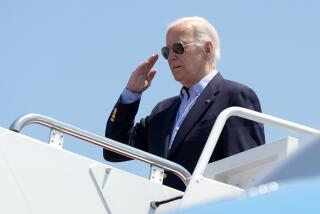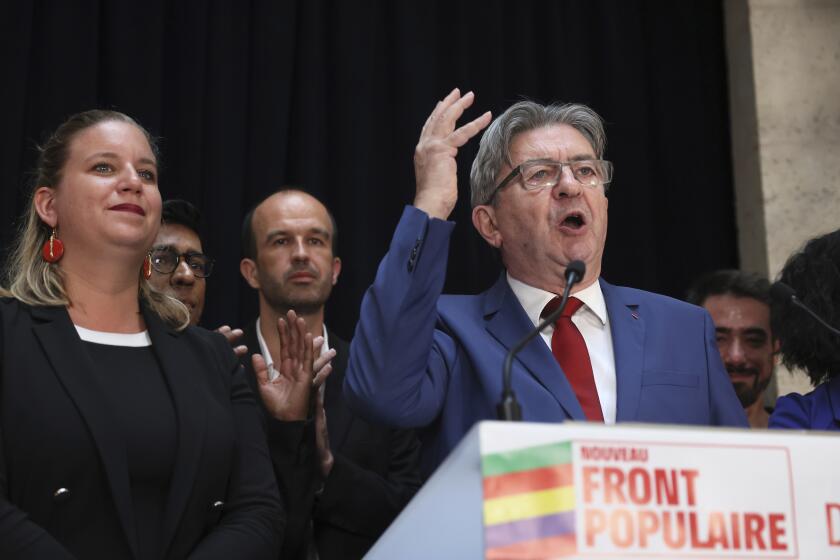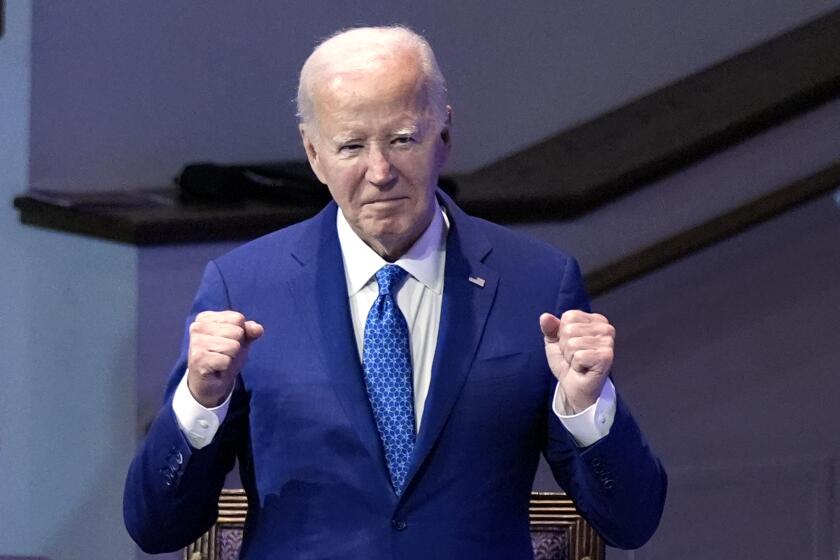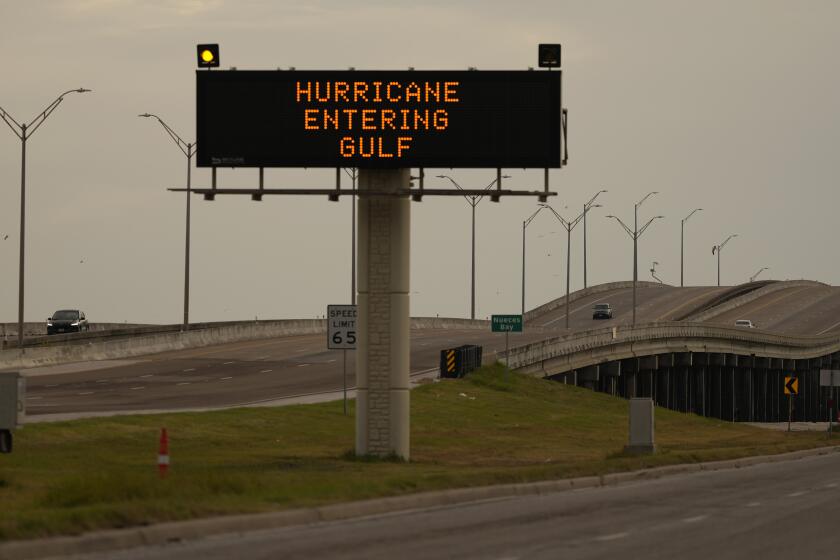Cuban Missile Crisis: A New View of the Brink : 25 Years Later, the Threat of a Nuclear Showdown Has Yet to Be Surpassed
Twenty-five years ago this month, John F. Kennedy was given perhaps the most troubling information any President had received since the bombing of Pearl Harbor a generation earlier.
It was a Tuesday morning and Kennedy, still in robe and slippers in his White House quarters, heard National Security Adviser McGeorge Bundy say: “Mr. President, there is now hard photographic evidence . . . the Russians have offensive missiles in Cuba.”
The Cuban missile crisis had begun.
For the next six days, Kennedy said nothing publicly about Bundy’s sobering revelation. He broke the news to the American people the following Monday. In a dramatic televised speech, he demanded that the Soviets remove the missiles--or else.
The specter of a nuclear face-down has always haunted the rival superpowers, but the anxiety of people everywhere during those October days has yet to be surpassed.
Odds Looked Bad
Would it mean nuclear war if the Soviets rejected Kennedy’s demands? The President believed the chances of all-out conflict were 1 in 3, or even 1 in 2.
After a week of agonizing tension, the Soviets backed down and agreed to meet Kennedy’s terms if the President pledged not to invade Cuba. The sense of relief worldwide was almost palpable.
Fresh information on the missile crisis indicates that Kennedy, who initially favored an air strike, softened his position considerably as the days passed and finally embraced a stand that went beyond even that advocated by his most dovish adviser, Adlai Stevenson, the U.S. ambassador to the United Nations.
According to new information from Kennedy’s secretary of state, Dean Rusk, the Soviets yielded without knowing that Kennedy was prepared to make a major additional concession to avoid nuclear war.
During the standoff over the missiles in Cuba, the United States gave every indication that it would settle for nothing less than Soviet capitulation. The U.S. military was on a full war footing, with missiles and B-52 bombers poised to rain the equivalent of 30 billion tons of TNT on Soviet territory.
In the aftermath, Kennedy was widely praised for his handling of the crisis. His apparent mixture of firmness and restraint enabled him to transcend the bitter memory of his failure in the Bay of Pigs 18 months earlier, and helped propel the Democrats to victory in the midterm elections a week after the crisis.
A Kennedy aide, Arthur Schlesinger Jr., wrote in 1965 that the President’s actions “dazzled the world” and “displayed the ripening of an American leadership unsurpassed in the responsible management of power.”
Over time, however, the treatment of Kennedy has been somewhat less kind. Some liberals accused him of adventurism and conservatives said the Soviets won the confrontation by extracting the no-invasion pledge.
President Reagan’s top assistant for Latin America, Elliott Abrams, has said he subscribes to the “revisionist theory” that the crisis represented a setback because the United States, in effect, became a “guarantor” of the survival of the Cuban revolution.
Indeed, Soviet leader Nikita Khrushchev said afterward that he did not see the removal of the missiles as a defeat. He said the purpose of the missiles had been to deter an American invasion of Cuba. When that objective was accomplished, they were no longer needed, he said.
At issue was Moscow’s installation of two types of missiles --one capable of range beyond Washington, D.C., and another that could reach targets deep into Canadian territory.
Their presence was detected on U.S. air reconnaissance flights over the island. The missile sites, once operational, would give the Soviets a nuclear strike capability not only against the United States, but virtually all nations of the Western Hemisphere.
Kennedy’s White House counsel, Theodore Sorensen, wrote that Kennedy and his top aides considered six options, from doing nothing to making secret approaches to Cuban Prime Minister Fidel Castro or applying diplomatic pressure on the Soviet Union. The hard-line alternatives included a naval blockade of Cuba, air strikes against the missile sites and an all-out invasion of the island.
Early in the crisis, Kennedy ruled out the softer choices because he regarded the missiles as an explicit threat to the peace and security of the Americas.
Kennedy at first wanted to bomb the missile sites, but retreated from that position, partly on the advice Llewellyn Thompson, who had just completed a tour of duty as ambassador to the Soviet Union. Thompson felt that air strikes might provoke Khrushchev into an immediate counterattack.
Kennedy moved to an increasingly dovish position as the crisis dragged on. In fact, unknown to all of his top advisers except Rusk, Kennedy was prepared in the end to offer the Soviets an even trade: the removal of Soviet missiles from Cuba in return for the U.S. withdrawal of Jupiter missiles from Turkey, just across the Black Sea from Soviet territory.
This fallback position was unknown until last August, when a letter from Rusk was quoted by the New York Times.
Kennedy never had to make this concession, because Khrushchev agreed to withdraw the missiles from Cuba, but for even suggesting the appearance of such a trade-off Stevenson, the U.N. ambassador, was regarded as a coward by some in Kennedy’s inner circle.
David Detzer wrote in his 1979 book, “The Brink,” that “their contemptuous reaction to (Stevenson) and his proposition would tarnish him for years.” The hawks around Kennedy felt that the United States should not have to “pay” for something the Soviets should be doing for “free.”
Kennedy believed he had to deal not only with the missile sites under construction but also with Soviet shipments to Cuba of military equipment, including missile parts.
He opted for a naval blockade of Cuba despite immense drawbacks. Detzer said the chief appeal of a blockade was that it was not “immediately violent” and therefore would be less likely to touch off retaliation.
Raymond L. Garthoff, Soviet affairs analyst at the State Department at the time of the crisis, said it showed that such confrontations can be managed and resolved.
But he added: “The experience also showed that many things escaped control and that crises may not always be manageable. In addition to thinking about the planning for crisis management, we ought to put more attention on crisis avoidance.”
Dean Acheson, a former secretary of state who died in 1971, once wrote: “When he seemed to be over the hump of the Cuban missile crisis, I wrote a note to President Kennedy congratulating him on his ‘leadership, firmness and judgment.’ . . . . It does not detract from the sincerity of this message to add I also thought he had been phenomenally lucky.”
Defense Secretary Robert S. McNamara was an early and forceful advocate of a naval blockade and soon was joined by Rusk and Atty. Gen. Robert Kennedy. Then there was the pro-bombing faction, led by the joint chiefs of staff and Acheson, whom Kennedy invited to join the secret deliberations that led to his televised speech.
Kennedy realized that all the alternatives had drawbacks, but that a blockade seemed “the least objectionable.” He could always bomb later if the blockade didn’t work. As a last resort, the United States could invade Cuba, and tens of thousands of troops were dispatched to Florida as part of a worst-case contingency plan.
At 7 p.m. on Monday, Oct. 22, 1962, Kennedy went on television and said that in response to a Soviet attempt to establish a nuclear strike capability in Cuba, the United States was imposing “a strict quarantine on all offensive military equipment under shipment” to that country.
He also said the United States would seek an emergency meeting of the U.N. Security Council to demand the prompt dismantling and withdrawal of all offensive weapons from Cuba under the supervision of U.N. observers.
That evening, Rusk mused about the perils of the nuclear age. In an earlier time, he said, “you could have a confrontation or a showdown, you could go to sleep and you’d wake up in the morning, and you’d be there, and the city would be there.” In the modern world, he said, people could not be so sure.
The following morning, Rusk stopped by the office of Undersecretary of State George Ball and found him asleep on the couch. Rusk woke Ball and said mischievously: “We have won a considerable victory. You and I are still alive.”
In Jacksonville, Fla., after Kennedy’s speech, the audience at a symphony concert spontaneously stood up and sang the national anthem.
Some Americans began hoarding food and other supplies. In a Los Angeles supermarket, one woman was seen filling four shopping carts at once.
The embargo began at 10 a.m. Wednesday, Oct. 24, with 63 ships assigned to keep Soviet military supplies from reaching Cuba. The operation involved 30,000 U.S. military pilots and seamen.
Kennedy and his aides met to monitor developments. At 10:25, a messenger came into the room and handed a note to CIA Director John McCone.
“Mr. President, we have a preliminary report which seems to indicate some Russian ships are stopping,” McCone said.
Rusk nudged Bundy and said: “We’re eyeball to eyeball, and I think the other fellow just blinked.”
A short time later, Washington learned that 20 Soviet ships closest to the quarantine barrier had stopped and were dead in the water or had turned around. They decided not to challenge the quarantine. In Cuba, meanwhile, work on the missile sites was uninterrupted.
By Friday morning, a U.S. invasion of Cuba seemed a real possibility. About 25,000 Marines were poised to make a landing and more than 100,000 Army troops in Florida were ready to follow.
The Defense Department was preparing to supply bomb shelters with food and water. The stock market had taken a dramatic plunge.
By Friday evening, however, there was less tension in the White House. Khrushchev sent Kennedy a long, rambling note indicating willingness to make a deal on the missiles--if the United States promised not to attack Cuba.
The Soviets conveyed a similar message through another channel. Alexander S. Fomin, a counselor at the Soviet Embassy presumed to be a KGB colonel, discussed such a deal during a hastily arranged meeting with ABC-TV news correspondent John Scali the same day. At Fomin’s request, Scali passed the message to the State Department.
The crisis seemed to be over, but optimism abruptly shifted to alarm the following morning, when a second note came from Khrushchev: The Soviets would remove the missiles from Cuba if the United States dismantled its “analogous weapons” in Turkey.
Kennedy was outraged by Khrushchev’s attempt to extract a price.
Months earlier, Kennedy had asked that the missiles in Turkey be dismantled because they were obsolete, but the military was taking its time in carrying out the directive. Yet Kennedy was reluctant to go along with Khrushchev’s proposal because it would then appear the United States had bartered on missiles.
The choice was agonizing: Give in and look weak or refuse and risk touching off a war.
It was then that Bobby Kennedy and Sorensen came up with what Detzer called a “brilliant stroke.” Instead of replying to the second message, they proposed accepting Khrushchev’s original terms.
The President and his advisers agreed to try it. Bobby Kennedy met Saturday evening with Soviet Ambassador Anatoly Dobrynin at the Justice Department.
The attorney general warned Dobrynin that the Soviets must make a commitment to removing the missiles within 24 hours or, Kennedy said, “we will remove them.”
Dobrynin asked Kennedy about the U.S. missiles in Turkey. Kennedy replied that the President had been eager to remove them and assured the Russian that they would be gone in four or five months.
It is still not known whether that pledge was decisive, but the next morning, the Soviets agreed to dismantle their missiles and take them home.
Euphoria spread through Washington. Kennedy felt he might be at the high point of his Administration but, perhaps recognizing how ephemeral such achievements are, he made an obvious reference to a slain predecessor, Abraham Lincoln: “This is the night I should go to the theater.”
Many Americans celebrated by taking in the first of 15 films about a British spy named James Bond. A U.S. television star came of age that same month, Johnny Carson.
The Soviets soon dismantled the missile sites and razed the installations. Within a few days, an aerial photograph of one site showed only a single dump truck driving slowly circling as the area was cleaned up. Three months later, the U.S. Jupiters in Turkey were gone.
Chastened by the experience, the superpowers agreed afterward to open a telephone hot line between Moscow and Washington. A year later, they signed a nuclear test ban treaty.
The Soviets soon began a major arms buildup, indicating that the nuclear superiority of the United States at the time may have contributed to the Soviet retreat.
More to Read
Start your day right
Sign up for Essential California for news, features and recommendations from the L.A. Times and beyond in your inbox six days a week.
You may occasionally receive promotional content from the Los Angeles Times.






